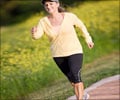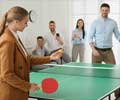A growing number of Americans are opting to get on their feet and stand on their jobs three centuries after Thomas Jefferson found standing up a superior way to work.

"We're sitting ourselves to an early death," said Rob Danoff, a family physician in Pennsylvania and member of the American Osteopathic Association with a special interest in preventative medicine.
"We are a 'potato' society," he told AFP in a telephone interview
"We sit most of the day, so we are work potatoes -- and then we go home and we are couch potatoes. That combination can be deadly."
- Risks of 'prolonged sitting' -
Adult Americans spend on average 7.7 hours a day engaged in "sedentary behavior," the National Institutes of Health has reported.
Advertisement
The longer people are sitting, the more difficult it is for their blood to circulate, explained Danoff, who cautioned that going to the gym after work affords no compensation.
Advertisement
Last year, the American Medical Association formally recognized the "potential risks of prolonged sitting" as it urged employers and employees alike to seek out alternatives to sitting, such as standing working stations -- some even equipped with a treadmill -- or isometric balls instead of desk chairs.
The message is starting to get around, with more Americans choosing standing desks -- like Jefferson, one of the US founding fathers and third president, prolific architect and well-known tinkerer, who favored standing when doing his tasks.
"Standing desks have been popular probably for 20 years in Europe, but not in the United States," said Jeffrey Meltzer, president of Applied Ergonomics, an Illinois firm that specializes in workspaces.
"In the states, they were seen as silly," said Meltzer, adding that he noticed a significant shift in 2013 when sales of standing desks leaped 50 percent.
- 'More pro-active' -
In trend-setting California, with its youthful and cutting-edge technology sector, standing desks have become increasingly commonplace.
In Washington, Kathleen Hale, the 34-year-old co-founder of Rebel Desk, has found a market among lawyers, university professors and health professionals for standing desks with slow-paced treadmills attached.
"People have been working for healthier working environments since it's the place where many of us are spending more time than we do with our families," Hale said.
Bilaal Ahmed, 34, founder of the startup Linktank, has embraced the concept of an adjustable office, even if he is in excellent health.
"It's more proactive," he said. "It's a desire to be healthy, to stay active even when I'm working. This is one of the best ways to do that."
He added: "It's not only to be standing, but also to have the computer at a certain level, so your arms are perpendicular to the body."
If he gets tired, Ahmed simply flops down into a nearby chair. Overall, he said he feels more alert, more aware and more productive.
Hale recommends mixing up positions throughout the day.
"Sometimes you stand. Sometimes you walk. And when you need to, you sit, to take a break," she said. "That's how we encourage people to think about sitting -- it's a time to take a break."
Danoff said staying in motion is key.
"We weren't made to sit all day," he said. "We were not made to stand all day. We were made to move. It's all about balance."
He said it is "unrealistic" to install standing desks in most places, as doing so could result in going from one extreme to another.
Just getting up for a moment every half-hour, going for a walk in the hallway, taking the stairs instead of the elevator and seeing a colleague instead of sending an email are all useful options.
"There are a lot of things that people can do which they don't do," he said. "You don't need all this fancy equipment. There are common things to do."
Source-AFP









